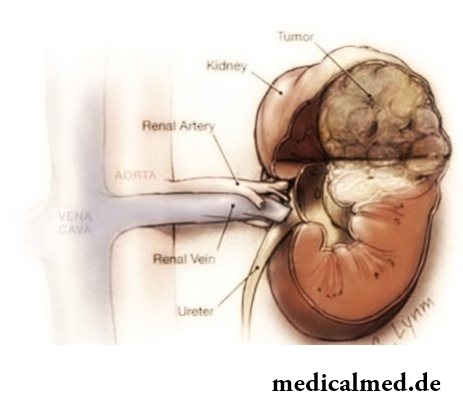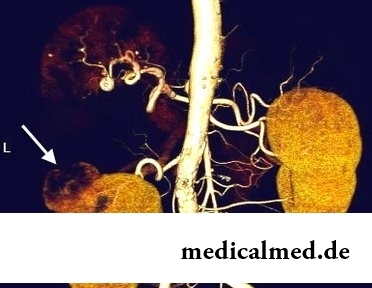





Kidney cancer
Short characteristic of a disease
 In structure of oncological diseases cancer of a kidney takes the 10th place, but it is necessary to consider that in recent years triple increase in number of the patients suffering from malignancies in kidneys is noted. Men get sick more often than women that, probably, is explained by distribution of smoking among a male part of the population and more harmful working conditions. Especially the fact that cancer therapy of a kidney even more often is required to young people though earlier given disease affected generally elderly people disturbs.
In structure of oncological diseases cancer of a kidney takes the 10th place, but it is necessary to consider that in recent years triple increase in number of the patients suffering from malignancies in kidneys is noted. Men get sick more often than women that, probably, is explained by distribution of smoking among a male part of the population and more harmful working conditions. Especially the fact that cancer therapy of a kidney even more often is required to young people though earlier given disease affected generally elderly people disturbs.
The most common form of a disease – nephrocellular cancer. More than 40% of the registered cases are the share of it. Much less often educations in a renal pelvis and an ureter meet (on 20%). Sarcomas (mesenchymal educations) make no more than 10% of number of the registered cases.
Causes of illness
Kidney cancer which symptoms are found in people of any age now arises owing to the following factors:
- disturbances at the genetic level, in particular, loss of a segment of the third chromosome;
- Gippelya-Lindau's syndrome and other hereditary diseases;
- immunodeficiency;
- uncontrollable reception of diuretic drugs, especially diuretic means;
- diabetes mellitus;
- improper feeding with dominance of greasy, fried food;
- ionizing radiation;
- smoking is one of the most important reasons on which the person has kidney cancer. Metastasises at smokers are much more numerous and the disease proceeds, as a rule, quite hard. In general, the smoking people develop cancer of a kidney 60% more often, than those who do not test thirst for nicotine and do not communicate with smokers.
Kidney cancer stages
Disease severity is defined on the basis of comparison of the healthy and struck cells.
The I stage – tumor cells slightly differ from normal, healthy cells of renal fabric. Cancer develops slowly, forecasts favorable.
The II stage – moderate differentiated – the most often meeting cancer form. Healthy and sick cells have accurately expressed distinctions, but the tumor still grows slowly and will respond to treatment.
The III stage – a tumor goes beyond a kidney, affects the lymph nodes located nearby.
The IV stage – undifferentiated cancer of a kidney. The struck cells considerably differ from healthy, indicate an aggressive form of a disease. At the IV stage cancer of a kidney gives metastasises in the next bodies (lungs, a liver) and the remote lymph nodes. Cancer therapy of a kidney at this stage is considerably complicated or at all it is impossible.
It is necessary to notice that allocating kidney stages, doctors can not only classify a disease, but also determine the tumor sizes, its localization, increasing thereby the level of survival of patients.
Kidney cancer – metastasises
At late stages a slope tumor to innidiation in both the hematogenous, and lymphogenous way. Most often metastasises come to light in lungs, then in bones, a liver and a brain. Damage of a brain is most of all characteristic of the IV stage.
Kidney cancer – symptoms
At early stages cancer of a kidney can proceed absolutely asymptomatically. It is possible to define existence of a tumor or it is accidental, or in the presence of separate indirect signs. In process of growth of tumoral process, symptoms are shown much more brightly. To main of them it is necessary to carry:
- presence of blood at urine;
- the swelling in a waist which is probed at a palpation;
- weakness, weight loss, lack of appetite;
- deterioration in the general state;
- sharp temperature increase without any visible reason;
- increase in arterial pressure;
- anemia;
- pains in kidneys.
Diagnosis of a disease
Kidney cancer which metastasises got into the next bodies and the remote lymph nodes is diagnosed rather easily. Other situation develops at early stages of a disease when it is easy to confuse symptoms of cancer of kidney with symptoms of other diseases. The huge role directed by the correct diagnosis is played by modern methods of medical visualization:
- x-ray diagnosis;
- ultrasonography;
- magnetic resonance tomography;
- radio isotope stsintigrafiya.
Besides, to patients the biopsy and a research of urine is appointed.
Cancer therapy of a kidney
 The choice of a technique of treatment depends on a stage of cancer of kidney, the sizes of a tumor, existence of metastasises and some other important factors. In most cases doctors use surgical intervention, and appoint operation even at metastasises as it allows to prolong the patient's life considerably.
The choice of a technique of treatment depends on a stage of cancer of kidney, the sizes of a tumor, existence of metastasises and some other important factors. In most cases doctors use surgical intervention, and appoint operation even at metastasises as it allows to prolong the patient's life considerably.
At early stages kidney cancer which symptoms are absent or are shown slightly, it can be cured by means of organ-preserving operations, but even in this case an indispensable condition is the extraction of tumoral blood clots and removal of regional lymph nodes excluding innidiation.
At late stages carrying out a radical nephrectomy is reasonable (removal of a kidney including at germination of a tumor in the next bodies) or a laparoscopic nephrectomy (allows to achieve more exact cutting off of body and by that reduces duration of the recovery period, but demands existence of the special equipment and high qualification of personnel of clinic). Radiation therapy, hormonal therapy and chemotherapy in cancer therapy of a kidney are practically not used as show a low performance. The immunotherapy using interleykina-2, alpha interferon and a 5-ftoruratsil helps to increase survival term.
Several words concerning that, the probability to successfully cure kidney cancer is how high. The forecast in this case depends on a stage of tumoral process and degree of a differentiation of cancer cells. If innidiation affected a renal vein, then forecasts bad. The same situation develops at metastasises in the remote lymph nodes. In all other cases forecasts more or less favorable.
According to researches, the women drinking several glasses of beer or wine in a week have the increased risk to develop breast cancer.

The advantage of swimming for the person is so high that this sport is not only the most popular, but also is widely applied in copper...
Section: Slideshow
Venereal diseases in medicine are called the infections which are transmitted preferential sexually, now they and are called - infections, sexually transmitted, or STD. Among them is also life-threatening. In spite of the fact that majority...
Section: Articles about health
History of use of an anesthesia during operations contains more than 160 years. Annually in the world hundreds of thousands of surgical interventions during which to patients the substances immersing them in a dream and saving from pain are entered are carried out. Using an anesthesia many myths and delusions are still connected. It is worth getting acquainted with the most widespread of them....
Section: Articles about health
Tea is loved and use almost everything. This drink has tonic properties, contains the tannins capable podavlit...
Section: Articles about health
Life activity of one-celled fungi of the sort Candida, related to yeast is a proximate cause of development of candidiasis (milkwoman). Normal these microorganisms are a part of the microflora living in an oral cavity and intestines of most of people, and that...
Section: Articles about health
Among a set of the perfumery and cosmetic goods which are released today the special group is made by the means containing antibacterial components. Such types of gels, shampoos, soaps, creams, lotions and other products are positioned by manufacturers as a panacea from all diseases caused by pathogenic microorganisms. The unlimited and uncontrolled use of similar means becomes result of trustfulness of the buyers hypnotized by persuasive advertizing sometimes. Many spetsial...
Section: Articles about health
Not everyone can brag of the shining Hollywood smile. Even at the person who is regularly visiting the stomatologist and watching з...
Section: Articles about health
All know that self-treatment is dangerous. However absolutely it is almost impossible to do without it. Rate of modern life does not allow to handle each small trouble to the doctor and information on ways of independent rendering medical the help...
Section: Articles about health
Climax - process of fading of reproductive function of an organism in process of its aging. At women the main sign of its approach is the termination of a menstrual cycle. Officially the menopause is diagnosed when periods are not observed within 12 months. Age changes quite often are followed by emotional failures, disturbance of thermal control and sweating, dizzinesses and headaches, tachycardia and other unpleasant phenomena. This complex of symptoms...
Section: Articles about health
Neurosis is called pathology of a nervous system at which deviations in functioning of the highest nervous processes are observed. Nye...
Section: Articles about health
It is difficult to revaluate importance of kidneys for an organism. These bodies not only perform work on purification of blood of decomposition products and removal of excess liquid. They are responsible also for production of some hormones necessary for normality maintenance...
Section: Articles about health
Such trouble as the milkwoman's attack, at least once in life happened almost to each woman. Prevalence of a disease is explained by the fact that the causative agent of an illness belongs to the so-called opportunistic microflora living on mucous membranes of any human body and which is becoming more active only under favorable conditions. If you had curdled allocations from a vagina, the itch and burning in external genitals, or painful feelings disturb at sex...
Section: Articles about health
The pine is one of the most widespread plants of our woods. Its needles and pitch not without reason called by "gallipot", since ancient times испол...
Section: Articles about health
According to data of World Health Organization, the cataract is diagnosed almost for 7% of the population of Earth. The statistics of incidence is considered not full as at an initial stage the illness, as a rule, does not cause to the person of special inconveniences, and many having got sick...
Section: Articles about health
The phenomenon of improvement of a condition of the patients at administration of drugs who are not containing active agents, so-called effect of placebo is known long ago. At the end of the 18th century the American doctor Perkins began to treat people the "miracle" sticks made of alloy of steel and brass. Was for several minutes to press such subject enough to a sore point that it became much easier for the patient. Having suspected Perkins of charlatanism, his colleagues tried to repeat "miracle" by means of sticks, steles...
Section: Articles about health
Each person supports all life a SARS about 200 times. The peak of incidence falls on cold season, but to get sick from temperatures...
Section: Articles about health
Helminthosis is one of the most widespread diseases. Statistically, any species of helminths infected every third inhabitant of the planet. Most of specialists even consider these data strongly underestimated: some uninvited "cohabitants" of N...
Section: Articles about health
Stroke (acute disorder of cerebral circulation) – one of the most widespread neurologic diseases. Annually in the world more than 6 million people die of this illness. From the survived patients about 80% become disabled people, and nearly a third from them needs afterwards permanent care. In fact, the stroke creates a situation at which a part of cells of a brain loses blood access, loses an opportunity to receive oxygen and nutrients, and perishes. As a result of a razviv...
Section: Articles about health
About 10-15 years ago existence of the computer in the apartment of the Russian was considered as a rarity and office rooms were only on перв...
Section: Articles about health
The technique of acupuncture (acupuncture) is used in the medical purposes more than three and a half millennia. It is eurysynusic and recognized as official medicine in the majority of the developed countries of the world. Influence by fine needles on so-called points...
Section: Articles about health
Residents of big cities quite often have a disease which is known as the syndrome of chronic fatigue (SCF) today. This illness affects the people belonging to various social and demographic groups and living on all continents. Most of all SHU are subject women aged from 25 up to 45 years. Statistically, the number of cases fluctuates in the different countries from 10 to 37 people on 100 thousand, but specialists believe that these figures are significantly underestimated as people, страдающ...
Section: Articles about health
Sugar - the digestible refined product which is not of special value for an organism of the modern person. Use...
Section: Articles about health
For most of the working people the problem of having a snack is particularly acute enough. Sooner or later there is a question: what can be eaten quickly between a breakfast and a lunch or a lunch and leaving from service so that to receive necessary power feed, but not an overload...
Section: Articles about health
80% of women at least once to lives complained of discomfortable feelings to breasts, consolidations and nagrubaniye. These are mastopathy symptoms. The mastopathy is characterized by change of a ratio between ferruterous and connective tissue tissues of mammary glands. It can lead to formation of cysts (a cystous mastopathy), gland consolidation (a fibrous mastopathy), or a combination of these processes (a fibrous and cystous mastopathy)....
Section: Articles about health
The state of health of the person in many respects depends on chemical composition of biological liquids of an organism. Specialists consider that з...
Section: Articles about health
Household skills which to us so diligently imparted in the childhood it appears, not always bring only benefit. According to results of the last researches, some habits which for a long time were considered useful and even necessary can become...
Section: Articles about health
It would seem, about it there can be no disagreements: water is necessary for a human body for normal life activity, and about how and when it should be drunk, all know. It turned out that the situation is not absolutely so: for many years there are very persistent delusions connected with this question. Let's consider the most widespread of them....
Section: Articles about health
